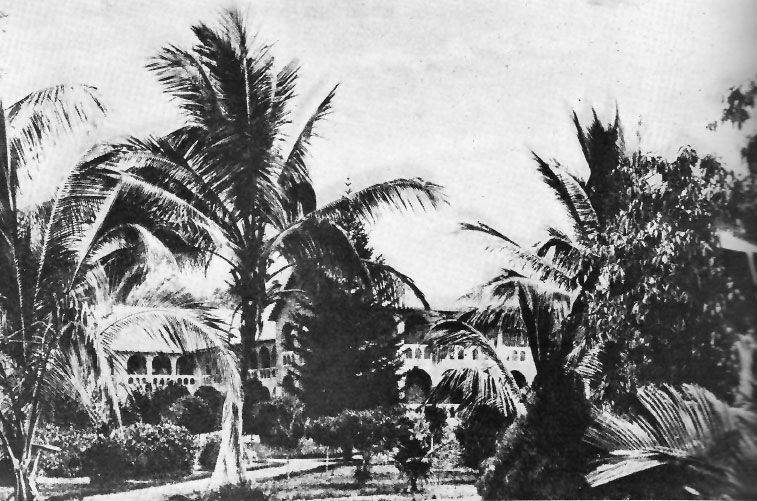|
Marcel Lihau
Marcel Antoine Lihau or Ebua Libana la Molengo Lihau (29 September 1931 – 9April 1999) was a Congolese jurist, law professor and politician who served as the inaugural First President of the Supreme Court of Justice of the Congo from 1968 until 1975 and was involved in the creation of two constitutions for the Democratic Republic of the Congo. Lihau attended the Catholic University of Leuven in Belgium with the help of sympathetic Jesuit educators, becoming one of the first Congolese to study law. While there he encouraged Congolese politicians to form an alliance that allowed them to secure the independence of the Congo from Belgium. He served briefly as a justice official and negotiator for the Congolese central government before being appointed to lead a commission to draft a permanent national constitution. He was made dean of law faculty at Lovanium University in 1963. The following year he helped deliver the Luluabourg Constitution to the Congolese, which was adopted b ... [...More Info...] [...Related Items...] OR: [Wikipedia] [Google] [Baidu] |
Court Of Cassation (Democratic Republic Of The Congo)
The Court of Cassation () is the main court of last resort in the Democratic Republic of the Congo. It has its seat in the Kinshasa Palace of Justice. The Court judges final appeals with respect to the "normal" system of justice, excluding cases of administrative justice, which go before the ''Conseil d'État''. The court consists of 26 justices, organized into legislative and judiciary sections. Judges are nominated by the Judicial Service Council, a separate and independent body composed of judges from the lower courts and public prosecutors. The first president of the Court of Cassation also sits on the General Assembly, which makes decisions on matters within the scope of the Supreme Council of the Judiciary (, CSM). Per Congolese law, the compulsory retirement age for magistrates on the Court of Cassation is 70 years old. See also *Constitutional Court of the Democratic Republic of the Congo The Constitutional Court () was established by the Constitution of the Third Repub ... [...More Info...] [...Related Items...] OR: [Wikipedia] [Google] [Baidu] |
Catholic University Of Leuven (1834–1968)
The Catholic University of Leuven or Louvain (french: Université catholique de Louvain, nl, Katholieke Hogeschool te Leuven, later ''Katholieke Universiteit te Leuven'') was founded in 1834 in Mechelen as the Catholic University of Belgium, and moved its seat to the town of Leuven in 1835, changing its name to Catholic University of Leuven.''Encyclopédie théologique'', tome 54, ''Dictionnaire de l'histoire universelle de l'Église'', Paris : éd. J.P. Migne, 1863, ''sub verbo'' ''Grégoire XVI'', col. 1131 : "Après sa séparation de la Hollande en 1830, la Belgique libérale a vu son Église jouir d'une véritable indépendance. Les évêques s'assemblent en conciles, communiquent avec le Saint-Siège en toute liberté. Sur l'article fondamental des études, ils ont fondé l'université catholique de Louvain, où les jeunes Belges vont en foule puiser aux sources les plus pures toutes les richesses de la science". And : Edward van Even, ''Louvain dans le passé et dans le pr� ... [...More Info...] [...Related Items...] OR: [Wikipedia] [Google] [Baidu] |
Radio Léopoldville
Radio is the technology of signaling and communicating using radio waves. Radio waves are electromagnetic waves of frequency between 30 hertz (Hz) and 300 gigahertz (GHz). They are generated by an electronic device called a transmitter connected to an antenna which radiates the waves, and received by another antenna connected to a radio receiver. Radio is very widely used in modern technology, in radio communication, radar, radio navigation, remote control, remote sensing, and other applications. In radio communication, used in radio and television broadcasting, cell phones, two-way radios, wireless networking, and satellite communication, among numerous other uses, radio waves are used to carry information across space from a transmitter to a receiver, by modulating the radio signal (impressing an information signal on the radio wave by varying some aspect of the wave) in the transmitter. In radar, used to locate and track objects like aircraft, ships, spacecraft an ... [...More Info...] [...Related Items...] OR: [Wikipedia] [Google] [Baidu] |
Philology
Philology () is the study of language in oral and writing, written historical sources; it is the intersection of textual criticism, literary criticism, history, and linguistics (with especially strong ties to etymology). Philology is also defined as the study of literary texts as well as oral and written records, the establishment of their authenticity and their original form, and the determination of their meaning. A person who pursues this kind of study is known as a philologist. In older usage, especially British, philology is more general, covering comparative linguistics, comparative and historical linguistics. Classical philology studies classical languages. Classical philology principally originated from the Library of Pergamum and the Library of Alexandria around the fourth century BC, continued by Greeks and Romans throughout the Roman Empire, Roman/Byzantine Empire. It was eventually resumed by European scholars of the Renaissance humanism, Renaissance, where it was s ... [...More Info...] [...Related Items...] OR: [Wikipedia] [Google] [Baidu] |
Flemish Language
Flemish (''Vlaams'') is a Low Franconian dialect cluster of the Dutch language. It is sometimes referred to as Flemish Dutch (), Belgian Dutch ( ), or Southern Dutch (). Flemish is native to Flanders, a historical region in northern Belgium; it is spoken by Flemings, the dominant ethnic group of the region. Outside of Flanders, it is also spoken to some extent in French Flanders and the Dutch Zeelandic Flanders. Terminology The term ''Flemish'' itself has become ambiguous. Nowadays, it is used in at least five ways, depending on the context. These include: # An indication of Dutch written and spoken in Flanders including the Dutch standard language as well as the non-standardized dialects, including intermediate forms between vernacular dialects and the standard. Some linguists avoid the term ''Flemish'' in this context and prefer the designation ''Belgian-Dutch'' or ''South-Dutch'' # A synonym for the so-called intermediate language in Flanders region, the # An indicatio ... [...More Info...] [...Related Items...] OR: [Wikipedia] [Google] [Baidu] |



